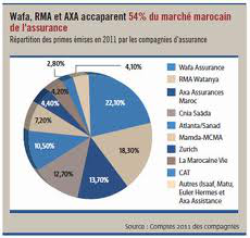In Morocco, the Bill creating the "Autorité de Contrôle des Assurances et de la Prévoyance Sociale - ACAPS" (Supervisory Authority of Insurance and Social Welfare) was submitted to the Council of Ministers.
http://www.thejournaofregulation.com/spip.php?article1501

In Morocco, after months of adjustments to bring together stakeholders, a draft law has been prepared and introduced in the Council of Ministers the end of May 2012. The Département des assurances du ministère (Insurance Department) will then give way to an independent regulator, the Autorité de Contrôle des Assurances et de la Prévoyance Sociale - ACAPS (Supervisory Authority of Insurance and Social Welfare). Independent of the Executive, the regulator is financed by a tax on insurers and the administrative fines which it imposes. It is composed of two bodies. The first determines the general policy of the Authority, fixes the financial contribution due from insurers, approves staff plan, grants licences to insurers. The second, sets up by the President, draws up the annual budget, and adopts the agenda of the meetings and the decisions of sanctions. The Board of discipline certainly presided by a magistrate of the Cour de cassation (Civil Supreme Court), only provides an advisory opinion to the President of the Authority on proposed sanctions.
© thejournalofregulation
The draft law 64-12 on Morocco presents several originalities with respect to standards of regulatory Authorities. Of course, the regulator is in certain aspects independent. Thus, under the financial perspective it is even more than in other countries, since it sets itself the organization of its budget and it keeps for it administrative fines that it delivers!
This gives it the means to exercise its mission, protect it from market pressures to financial pressures from the Executive which may even alienate it and letting it defenceless, but this can also encourage it to make unjustified fines to obtain a beneficial budget. The weapon can be a two-edged sword. Then, the regulator is of course composed of two bodies, one rather general and one who decides the sanctions. But it seems to move away of the reference model because the second body is only composed of the President of the Regulatory Authority.
In addition, not only it is endowed with the power to sanction, that it exercises alone, because the Disciplinary Committee has only a power of advisory opinion, but it still has the power, which we know the extreme importance in the facts, to convene and establish the agenda of meetings and prepare the budget proposals.
Therefore, the only reading of the draft can wonder about the governance of the Authority. With regard to the mission of the regulator, the text gives it superior powers to those which were endowed to the Insurance Division. Indeed, the Authority will not only grant the licences and can remove them for breach, not still exercise a supervisory task, involving the obligation of all of seeking the approval of their status and a right for the supervisory Authority on the basis of documents stress on any organization, insurer but also pension and mutual fund.
The Authority will exercise a control in case of merger and acquisition in the sector, requiring a licence. In this case, professionals who participate in the Authority have to withdraw in order not to be in conflict of interest. As we see in Morocco, the regulation of insurance was institutionally outsourced of the Government. The facts will validate the effectiveness of independence, and its appropriate measure: the President has too much or too little power? It then comes back to the key role that will play the appointment of the President and its personality.

your comment